
Medically reviewed by
Dr. John Rackham
Written by Michael Wright
Updated on November 3rd, 2021
CBD is a journey of discovery, both of the cannabinoid compound itself and of the beneficial effects CBD can have on your body. Even if you’ve skipped all the research and plunged straight into a bottle of tasty CBD gummies, you’ve still tracked the effects you felt from your CBD product. But many people embrace the idea of a deep dive into what CBD is, how CBD works, and which types of products are best for their individual needs. Our goal at CBDfx is to help people learn about every facet of CBD, so that they can make informed decisions when they choose to try various CBD products.
One of the things you learn when you start to explore hemp-derived CBD, is that there are different types of CBD. That is to say, when CBD is extracted from the hemp plant, there are different processes used that result in three different types of CBD oil. These are called full spectrum CBD oil, broad spectrum CBD oil, and CBD isolate.
Before we get into the specifics of the types of CBD oil, let’s have a quick refresher course on what exactly CBD is.
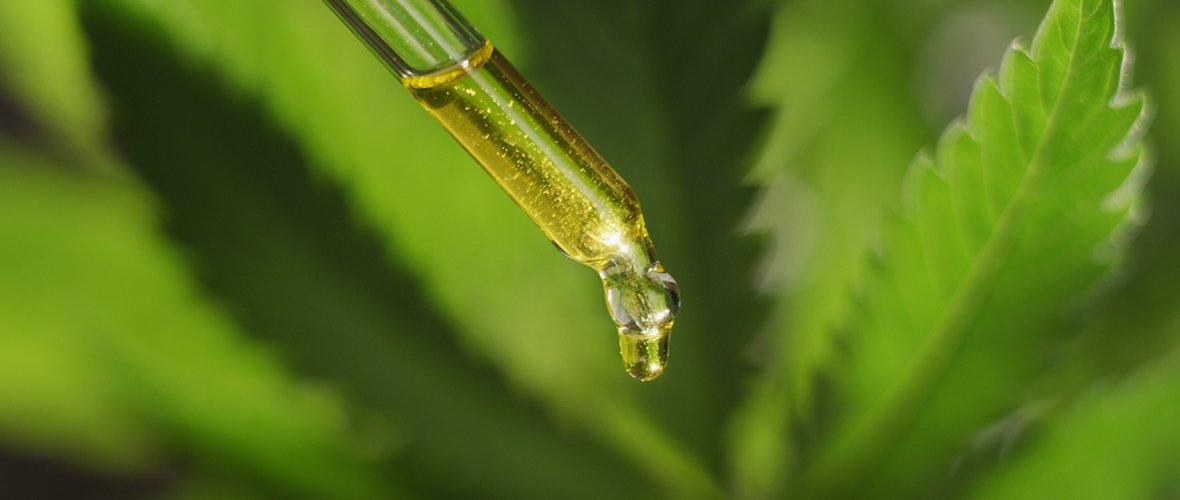
Types of CBD Oil: What Is CBD?
To understand CBD, it’s important to understand where it comes from. And that means understanding the difference between the words, “cannabis,” “hemp,” and “marijuana.”
Cannabis, Hemp, THC, and CBD
Cannabidiol (or CBD, for short) is one of a group of chemical compounds found in the hemp plant. A hemp plant is a cannabis plant with less than 0.03% THC in it (THC being the cannabinoid that gets you “high”). By contrast, a marijuana plant is a cannabis plant with a higher percentage of THC — sometimes much higher THC content. So, when we’re talking about hemp-derived CBD products, we’re talking about products using non-intoxicating chemical compounds. So, if it doesn’t get you “high,” you might ask, what does CBD do?
CBD, Cannabinoids, and the Endocannabinoid System
Well, let’s step back and look closer at this group of chemical compounds found in the hemp plant. They’re called cannabinoids. Though they’re plant based (phytocannabinoids), CBD and its cannabinoid siblings (such as THC, CBG, CBN, CBC, etc.) bear a remarkable resemblance to chemical compounds produced by our own bodies, called endocannabinoids. Endocannabinoids are part of the body’s endocannabinoid system.
This system supports and regulates other crucial systems and organs, most notably the immune system and the central and peripheral nervous systems. These systems regulate such vital functions as sleep, mood, memory, appetite, pain and inflammation management, stress, motor control, and more. Cannabinoids, like CBD, mimic endocannabinoids’ ability to bind to receptors in this system and, themselves, bolster the endocannabinoid system.
This is what makes the wellness potential of hemp-derived CBD oil so exciting. In terms of breadth of potential benefits to the body, it’s difficult to find a wellness supplement as versatile and powerful as cannabidiol.
Now, about that CBD oil.
Understanding CBD: What Is CBD Oil?
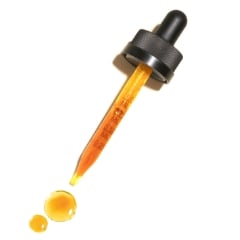
Technically, there are two forms of cannabis oil. When hemp plants reach maturation, they are culled for their oil. There are two different areas from which hemp oil is extracted. The first type is hemp seed oil. As the name implies, this oil is derived from the seeds of the hemp plant. Hemp seed oil has its own beneficial properties. The moisturising properties of hemp seed oil make it great for skin care products.
Hemp seed oil should not be confused with CBD oil. CBD oil is derived from the buds, leaves and stalks of the hemp plant. This is the oil that is rich in cannabinoids, including CBD. When you purchase a CBD product, it is produced from hemp-derived CBD oil.
Understanding CBD Oil: Hemp Oil vs. CBD Oil vs. Hemp Seed Oil
Sometimes, CBD products are labeled as hemp oil or hemp oil products. This is accurate terminology. In fact, if you wish to purchase our original CBD oil tincture, you’ll find that the label says, Hemp Tincture. Of course, the label also tells you that it is a CBD product and even tells you that the oil is broad spectrum and also tells you how much CBD is in your bottle.
However, there are unscrupulous companies that try to sell unknowing consumers hemp seed oil and pass it off as “hemp oil.” Again, hemp seed oil contains no CBD, so this terminology is misleading. That’s why it’s very important to read the ingredients on the label before you purchase any CBD or hemp product.
Types of CBD: Full Spectrum CBD Oil vs. Broad Spectrum CBD Oil vs. CBD Isolate
When we talk about types of CBD oils — full spectrum CBD oil vs. broad spectrum CBD oil vs. CBD isolate — we’re largely referring to the extraction and filtration processes that take place in the removal of this oil from the hemp plant.
Types of CBD Oil: Full Spectrum CBD
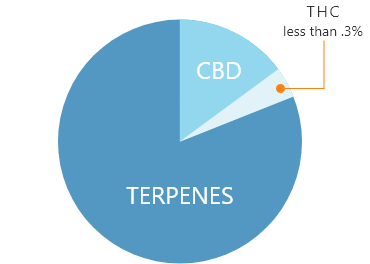
Full spectrum CBD oil is oil that contains the full cannabinoid profile of the hemp plant, including CBD, CBG, CBN, a tiny trace of THC (below 0.3%, so non-intoxicating), and other cannabinoids. Full spectrum oil also contains the terpenes and flavonoids of the cannabis plant, as well.
When all of these cannabinoids are taken together, they produce a phenomenon called the Entourage Effect, wherein the various cannabinoids don’t simply work individually, in parallel with one another. Instead, they work synergistically, enhancing each other’s effects and creating a deeper level of therapeutic benefits.
Full Spectrum CBD Products in the UK
Full spectrum CBD cannot be sold legally in the UK. Although the amount of THC in full spectrum oil is not enough to be intoxicating, it is still above the UK legal threshold of 0.2%. So, if you see a CBD product online or in a store labeled as full spectrum CBD, either the label is misleadingly marked or it is an illegal product.
Types of CBD Oil: Broad Spectrum CBD
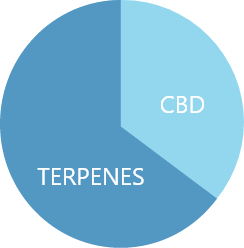
Broad spectrum CBD oil is CBD oil that has undergone an additional filtering process to remove the trace amounts of THC that exist in full spectrum CBD. You’ll often see this noted as ND-THC, meaning that there are non-detectable amounts of THC in broad spectrum CBD products (and CBD isolate products). While this process can also remove some other cannabinoids, terpenes and flavonoids present in the hemp plant, broad spectrum CBD oil still retains a good amount of cannabinoids and the other cannabis compounds. As a result, broad spectrum CBD products can give users some of the Entourage Effect experience, though less pronounced than in full spectrum CBD products. To make up for this and to enhance the effects of broad spectrum CBD, fatty oils (such as coconut-derived MCT oil) are often added to the ingredients, aiding in the body’s absorption of the cannabidiol.
Broad Spectrum CBD for Nearly Every Product Type
Broad spectrum CBD provides the most robust CBD experience legally available in the UK. Broad spectrum CBD oil is perfect for people who want to avoid THC altogether, while still enjoying the calming wellness benefits of CBD. Because of this, we use broad spectrum CBD in more of our CBD products than any other type of CBD oil. You can find broad spectrum CBD in our CBD Gummies, CBD Soft Gel and Morning Capsules, CBD Edibles, CBD Oil Tinctures, CBD Topical Creams and Balms, and other CBD products.
Types of CBD Oil: CBD Isolate
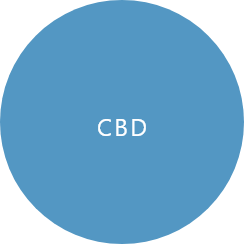
CBD isolate is 99% pure CBD with all other active plant matter — other cannabinoids, terpenes, essential oils — removed. You won’t experience the Entourage Effect with CBD isolate, but you will have the purest form of CBD possible. For some, that is a preference.
Typically, CBD isolate comes in a powder or crystalline form. CBD isolate oils are generally made when this crystalline CBD isolate is combined with an oil, such as the aforementioned MCT oil.
Isolate CBD Products
CBD isolate works well in some vape juices. Without the hemp plant’s natural terpenes and flavonoids, the flavour and smell of the hemp takes a back seat to the fruity or minty juice flavours that make CBD vapes so popular. We also offer CBD vaping products in broad spectrum CBD, to give our customers a choice. Broad spectrum CBD can be found in our CBD pens, specifically.
We also use CBD isolate in our CBD Bath Bombs, again, to let the scents and soothing effects of the other ingredients come to the fore. While you won’t experience the Entourage Effect, you will have a luxurious sensory experience.
Know Your CBD Oils: Which CBD Oil is Right for Me?
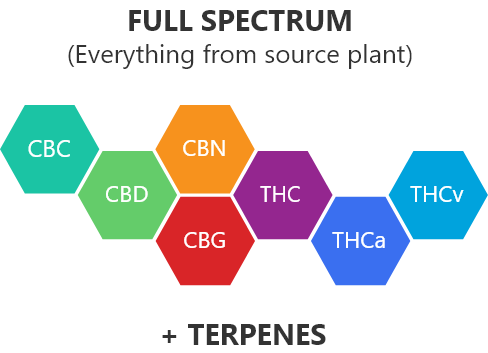
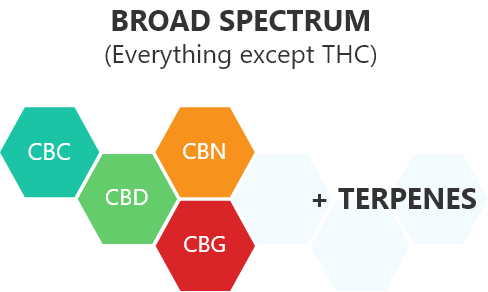
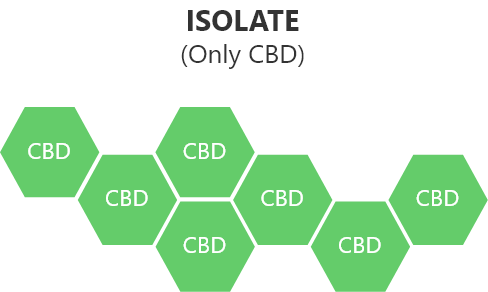
Now that you know the difference between full spectrum CBD oil, broad spectrum CBD, and isolate CBD, the question then becomes, “Which CBD oil works best for me?” We can’t tell you the answer to that one. Every person is different. Not only are our needs different — sleep aids, pain relief, fighting stress — but our physiologies are, too. We can all experience the effects of CBD differently.
Shopping for CBD Oils
The best thing you can do, if you’re interested in trying CBD, is to experiment with different CBD products. Pay attention to whether your CBD product has broad spectrum CBD or CBD isolate (and watch out for products labeled as full spectrum CBD!). Also, make note of how many grams of CBD are in each serving. Also, track what method of consumption you are using, and note that bioavailability (the extent and rate at which your body absorbs CBD) varies depending on whether the product is a CBD vape, CBD topical, CBD edible, or some other CBD product.
If you keep an eye on all of these factors, you should be able to draw a bead on what CBD product works best for your needs. We wish you the best of luck, and encourage you to use our site as a reference source whenever a question arises!
Ready to begin your CBD journey? Try our Original Mixed Berry CBD Gummies, featuring 50mg of all-natural, broad spectrum CBD per serving. XTrader
- Ferguson, Sian. “Hemp vs. Marijuana: What’s the Difference?” Healthline.com, https://www.healthline.com/health/hemp-vs-marijuana. 27 August 2020.
- Holland, Kimberly. “CBD vs. THC: What’s the Difference?” Healthline.com, https://www.healthline.com/health/cbd-vs-thc. Updated 20 July 2020.
- Eske, Jamie. “CBD: Does It Cause a High?” Medical News Today, https://www.medicalnewstoday.com/articles/does-cbd-get-you-high. 31 August 2020.
- Raypole, Crystal. “A Simple Guide to the Endocannabinoid System.” Healthline.com, https://www.healthline.com/health/endocannabinoid-system. 17 May 2019.
- Bauer, Brent A. “What Are the Benefits of CBD — And Is It Safe to Use?” Mayo Clinic, https://www.mayoclinic.org/healthy-lifestyle/consumer-health/expert-answers/is-cbd-safe-and-effective/faq-20446700. 18 December 2020.
- Moltke, Julie and Hindocha, Chandni. “Reasons for Cannabidiol Use: A Cross-sectional Study of CBD Users, Focusing on Self-perceived Stress, Anxiety, and Sleep Problems.” Journal of Cannabis Research, https://jcannabisresearch.biomedcentral.com/articles/10.1186/s42238-021-00061-5. 18 February 2021.
- Murray, Dana. “CBD Oil vs. Hempseed Oil: How to Know What You’re Paying for.” Healthline.com, https://www.healthline.com/health/hemp-vs-cbd-oil. Updated 3 April 2020.
- Jorczyk, Sarah. “What’s the Difference Between Full Spectrum, Broad Spectrum and Isolate?” CBDOilUsers.com, https://cbdoilusers.com/full-spectrum-cbd-oil-vs-isolate. 2 January 2018.
- Mutchler, Cristina. “What Is Full-Spectrum CBD?” Very Well Health, https://www.verywellhealth.com/what-is-full-spectrum-cbd-5088630. 5 February 2021.
- Leonard, Jayne. “What to Know About CBD Isolate.” Medical News Today, https://www.medicalnewstoday.com/articles/cbd-isolate. 11 March 2020.